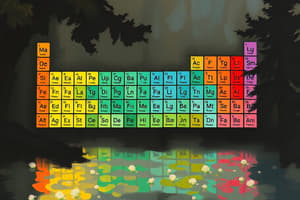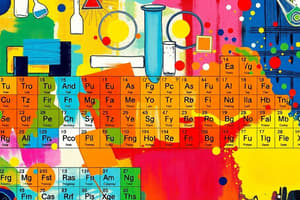Podcast
Questions and Answers
What is the number of protons in Hydrogen (H)?
What is the number of protons in Hydrogen (H)?
- 3
- 1 (correct)
- 2
- 4
What is the number of neutrons in Helium (He)?
What is the number of neutrons in Helium (He)?
- 1
- 2 (correct)
- 0
- 4
What is the number of electrons in Lithium (Li)?
What is the number of electrons in Lithium (Li)?
- 4
- 3 (correct)
- 5
- 6
How many protons are in Beryllium (Be)?
How many protons are in Beryllium (Be)?
What is the neutron count in Boron (B)?
What is the neutron count in Boron (B)?
How many neutrons does Carbon (C) have?
How many neutrons does Carbon (C) have?
What is the number of protons in Nitrogen (N)?
What is the number of protons in Nitrogen (N)?
What is the number of neutrons in Oxygen (O)?
What is the number of neutrons in Oxygen (O)?
How many neutrons are in Fluorine (F)?
How many neutrons are in Fluorine (F)?
What is the number of protons in Neon (Ne)?
What is the number of protons in Neon (Ne)?
How many neutrons does Sodium (Na) have?
How many neutrons does Sodium (Na) have?
What is the number of protons in Magnesium (Mg)?
What is the number of protons in Magnesium (Mg)?
What is the number of neutrons in Aluminium (Al)?
What is the number of neutrons in Aluminium (Al)?
What is the proton count in Silicon (Si)?
What is the proton count in Silicon (Si)?
How many protons does Phosphorus (P) have?
How many protons does Phosphorus (P) have?
What is the number of neutrons in Sulfur (S)?
What is the number of neutrons in Sulfur (S)?
How many neutrons does Chlorine (Cl) have?
How many neutrons does Chlorine (Cl) have?
What is the number of protons in Argon (Ar)?
What is the number of protons in Argon (Ar)?
How many neutrons does Potassium (K) have?
How many neutrons does Potassium (K) have?
What is the number of protons in Calcium (Ca)?
What is the number of protons in Calcium (Ca)?
Flashcards are hidden until you start studying
Study Notes
First 20 Elements Overview
- Hydrogen (H): 1 proton, 1 electron, 0 neutrons
- Helium (He): 2 protons, 2 electrons, 2 neutrons
- Lithium (Li): 3 protons, 3 electrons, 4 neutrons
- Beryllium (Be): 4 protons, 4 electrons, 5 neutrons
- Boron (B): 5 protons, 5 electrons, 6 neutrons
- Carbon (C): 6 protons, 6 electrons, 6 neutrons
- Nitrogen (N): 7 protons, 7 electrons, 7 neutrons
- Oxygen (O): 8 protons, 8 electrons, 8 neutrons
- Fluorine (F): 9 protons, 9 electrons, 10 neutrons
- Neon (Ne): 10 protons, 10 electrons, 10 neutrons
- Sodium (Na): 11 protons, 11 electrons, 12 neutrons
- Magnesium (Mg): 12 protons, 12 electrons, 12 neutrons
- Aluminium (Al): 13 protons, 13 electrons, 14 neutrons
- Silicon (Si): 14 protons, 14 electrons, 14 neutrons
- Phosphorus (P): 15 protons, 15 electrons, 16 neutrons
- Sulfur (S): 16 protons, 16 electrons, 16 neutrons
- Chlorine (Cl): 17 protons, 17 electrons, 18 neutrons
- Argon (Ar): 18 protons, 18 electrons, 22 neutrons
- Potassium (K): 19 protons, 19 electrons, 20 neutrons
- Calcium (Ca): 20 protons, 20 electrons, 20 neutrons
Key Information
- Elements are identified by the number of protons in their nucleus, which is equal to the number of electrons in a neutral atom.
- Neutrons contribute to the atomic mass but do not affect the charge of the atom.
- Carbon, with 6 of each particle, is essential for life and forms the basis of organic chemistry.
- Neon, Argon, and Helium are noble gases, known for their lack of reactivity due to having full electron shells.
- Elements like Sodium and Potassium are alkali metals, which are highly reactive, especially with water.
- Calcium plays a crucial role in biological systems, particularly in bone formation and cellular processes.
Groups of Elements
- Lightest elements include Hydrogen and Helium.
- Transition to heavier elements sees gradual increases in neutrons with heavier elements having more stability.
- Nonmetals dominate the beginning of the list, with metals becoming more common in higher atomic numbers.
- Each element's properties influence its usage in various industries and biological systems.
Studying That Suits You
Use AI to generate personalized quizzes and flashcards to suit your learning preferences.




